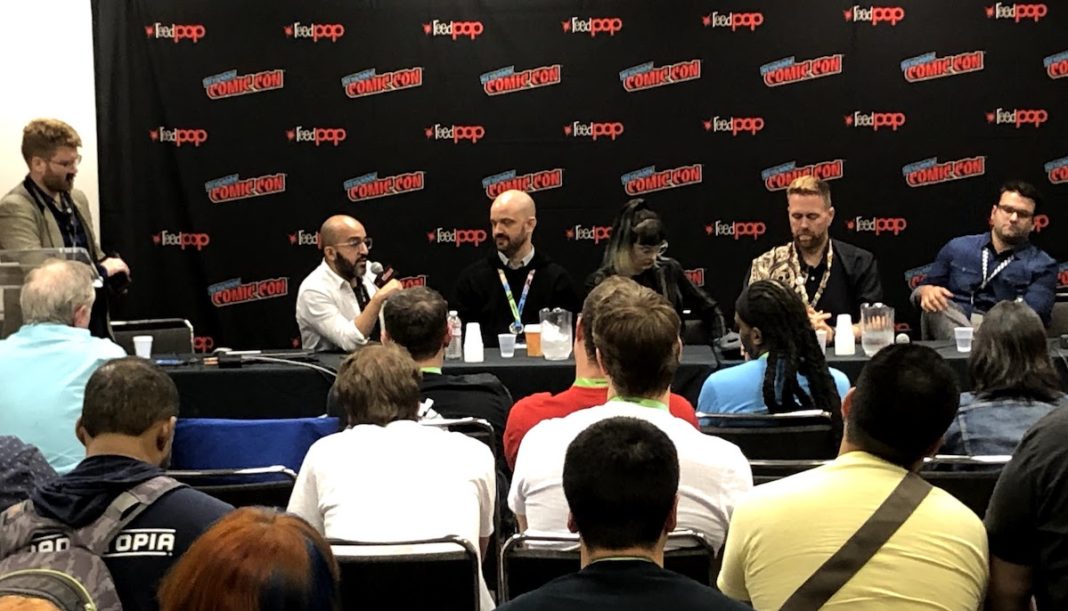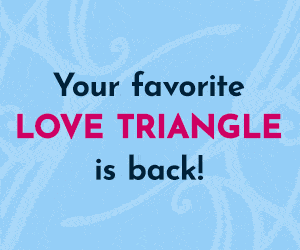Abraham Reisman said he opens his “Business of Comics” panel the same way every NYCC: by saying the industry is in upheaval. But that’s because it’s true every year. At this year’s panel, the Vulture writer then went on to introduce his guests: ComicHub partner Atom Freeman, Aftershock Senior Retailer Relations Manager RuthAnn Thompson, Geppi Family Enterprises/Diamond Comic Distributors Chief Relationship Officer Chris Powell, Hivemind VP Brand & Content Strategy (and former Valiant VP Marketing & Communications) Hunter Gorinson, and Hivemind co-founder/former Valiant CEO & CEO Dinesh Shamdasani.
Following introductions, Reisman asked the panelists about their big breaks.
Freeman said he walked into a comic shop and was asked if he wanted a job. He went on to own the store and win the Eisner Award for Retailing. After 10 years in retailing, he took a job at Top Cow as its Director of Sales Marketing. He now works at ComicHub, a point-of-sale system for comics. He said comic shops don’t jump up or down as much as other businesses; some stores close but others open.
Thompson was the President of Sponsorships & Events, which led to promoting conventions, which led her to become Aftershock’s Senior Retailer Relations Manager.
Powell started working at Lone Star Comics, going on to become its general manager. He then opened mycomicshop.com. From there he moved to Maryland and now he supervises relationships between vendors and customers for Diamond.
Forinson became a journalist but changed course and decided to be a Marvel intern at 27, where he had a boss who was six years younger than him. He became the VP of Marketing & Communications for Valiant before joining Hivemind.
Shamdasani described how he successfully rehabilitated Valiant into one of the most successful indie comic book companies as its CCO. After Valiant was acquired he co-founded Hivemind, which has worked on The Expanse and the upcoming Bloodshot movie.
Reisman then asked what common misconceptions the panelists often came across. A few misconceptions the panelists named were:
- Only Marvel and DC make popular comics
- All stores are run by someone reminiscent of The Simpsons character Comic Book Guy, even though comic stores that have survived are great at fostering community
- Diamond is central to all the problems faced by Direct Market
The panel discussed how fascinating it is that comics are still primarily sold in print and through mom and pop stores. They agreed that reading comics is a very tactile experience, at least to longtime readers, and mused that the lack of chains might be owed to the communities fostered by local stores and the interconnected universes of Marvel and DC.
Reisman learned over the years that the creators, publishers, and retailers that survive will recognize what the next generation cares about. His younger half-sister doesn’t care about superheroes, even when it’s a comic made for kids like Moon Girl and Devil Dinosaur. How can the industry adapt to the interests of children, particularly young girls? That’s the question the industry needs to answer.
Freeman, one of the few people in the industry with access to sell-through data, shared that only three or four of the Top 10 graphic novels feature superheroes. The panel discussed how even frequent readers feel lost trying to follow superhero titles and how they appeal to 40 year-old superfans rather than try to build a new audience. That’s why a new graphic novel by Raina Telgemeier was the #1 book in the country, something a superhero comic has never come close to achieving.
The panel considered Amazon as a mixed bag for the industry. The online retailer exposes more people to comics, sure, but its heavy discounts hurt small businesses trying to compete with the corporation. At the same time, Amazon is very important to publishers’ overall sales. The bright side is that Amazon doesn’t sell periodicals, in part because the comic book industry has encouraged the company not to enter that market.
Digital comics were brought up, and the panel largely considered them as a good thing for comics retailing. Panelists said that digital comics introduce people to the medium which ultimately gets them in the doors of comic shops. Plus, ComiXology is critical for fans who live in areas that don’t have a comic shop. Digital comics also hold the potential to serve entirely different audiences, since they can do a lot that the traditional comic book format can’t.
More of the traditional book publishers are entering the graphic novel market, which the panel considered that a net positive. When publishers create lines of graphic novels, they offer comics more legitimacy, which can help other graphic novels reach bookstores.
When asked about new job opportunities in the comic book industry, the panel agreed that the industry most needs people who can comics into consumers’ hands. Marketing positions will open up as more publishers realize the importance of that.
The panel was wide-ranging and informative, an excellent conversation covering many aspects of the business of comics. If you plan to attend NYCC 2020, I highly encourage readers to seek it out.












